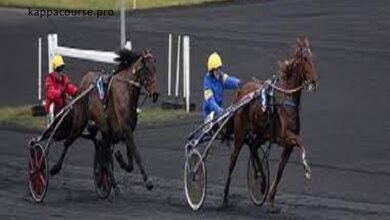Mastering the Course PMU: A Comprehensive Guide for Success

Introduction
Horse racing has long been a popular sport with a rich history. Betting on horse races, known as Pari Mutuel Urbain (PMU) in France, is a thrilling and potentially rewarding endeavor. This guide delves deep into the world of Course PMU, providing you with essential knowledge and strategies to increase your chances of success.
What is Course PMU?
Course PMU, or Pari Mutuel Urbain, is a French system of betting on horse races where all bets are pooled together. The final payout is determined by the total amount of money bet and the number of winning tickets. This system offers unique opportunities and challenges compared to other betting methods.
History of Course PMU
Understanding the history of Course PMU can provide valuable context. Established in 1930, the PMU has evolved over the decades, adapting to changes in technology and betting trends. Knowing its history helps appreciate the nuances of modern Course PMU betting.
How Course PMU Works
Course PMU operates on a pari-mutuel system, meaning all bets of a particular type are pooled together. After taxes and a house take are removed, the remaining amount is distributed among the winning bets. This system ensures fairness and transparency in payouts.
Types of Bets in Course PMU
There are various types of bets you can place in Course PMU. These include Simple Win, Place, Exacta, Quinella, Trifecta, and more. Each type of bet has its own rules and payout structures, offering different levels of risk and reward.
Analyzing Past Performances
To succeed in Course PMU, analyzing past performances of horses is crucial. This involves studying form guides, which provide information on a horse’s previous races, including wins, losses, and other relevant statistics. Understanding past performances helps in making informed betting decisions.
Importance of Jockeys and Trainers
In Course PMU, the skill of the jockey and the expertise of the trainer can significantly influence the outcome of a race. Researching and understanding the track records of jockeys and trainers can give you an edge in predicting race outcomes.
Race Conditions
Race conditions, such as track surface, weather, and distance, play a vital role in Course PMU betting. Different horses perform better under specific conditions. Analyzing how race conditions affect performance is essential for making accurate predictions.
Managing Your Betting Bankroll
Successful Course PMU betting requires disciplined bankroll management. This involves setting a budget for your bets, sticking to it, and not chasing losses. Proper bankroll management ensures you can bet sustainably over the long term.
Using Course PMU Betting Tools
There are various tools and resources available to assist in Course PMU betting. These include online platforms, mobile apps, and statistical software. Utilizing these tools can enhance your betting strategy and improve your chances of winning.
Common Mistakes to Avoid
Avoiding common mistakes is crucial in Course PMU. Some pitfalls include betting on too many races, ignoring race conditions, and failing to manage your bankroll. Recognizing and avoiding these mistakes can help you become a more successful bettor.
Advanced Betting Strategies
For those looking to take their Course PMU betting to the next level, advanced strategies such as hedging bets, using betting syndicates, and analyzing betting trends can be highly effective. These strategies require more knowledge and experience but can yield significant rewards.
Legal Aspects of Course PMU
Understanding the legal aspects of Course PMU is important for responsible betting. Different countries have varying regulations regarding horse race betting. Ensuring you comply with these regulations is crucial for a smooth betting experience.
Impact of Technology on Course PMU
Technology has greatly influenced Course PMU, from online betting platforms to real-time data analytics. Staying updated with technological advancements can provide new opportunities and tools for improving your betting strategy.
Case Studies of Successful Bettors
Learning from the experiences of successful Course PMU bettors can provide valuable insights. Case studies highlight their strategies, decision-making processes, and how they overcame challenges. This can serve as inspiration and guidance for your own betting endeavors.
Future of Course PMU
The future of Course PMU is shaped by trends such as increasing digitalization, the use of big data, and changing regulatory landscapes. Understanding these trends can help you stay ahead of the curve and adapt your betting strategies accordingly.
Conclusion
Mastering Course PMU requires a blend of knowledge, strategy, and discipline. By understanding the intricacies of the betting system, analyzing relevant data, and employing effective strategies, you can enhance your chances of success. Always remember to bet responsibly and continuously improve your skills.
FAQs
1. What is the best type of bet to place in Course PMU? The best type of bet depends on your risk tolerance and knowledge. Beginners might prefer Simple Win or Place bets, while experienced bettors might explore Exacta or Trifecta for higher rewards.
2. How can I improve my chances of winning in Course PMU? Improving your chances involves studying past performances, understanding race conditions, researching jockeys and trainers, and employing disciplined bankroll management.
3. Are there any tools to help with Course PMU betting? Yes, there are various online platforms, mobile apps, and statistical software available that provide data and insights to assist in making informed betting decisions.
4. What should I avoid when betting on Course PMU? Common mistakes to avoid include betting on too many races, ignoring race conditions, failing to manage your bankroll, and not doing sufficient research.
5. How has technology impacted Course PMU betting? Technology has revolutionized Course PMU betting through online platforms, real-time data analytics, and advanced betting tools, providing bettors with more information and convenience.




